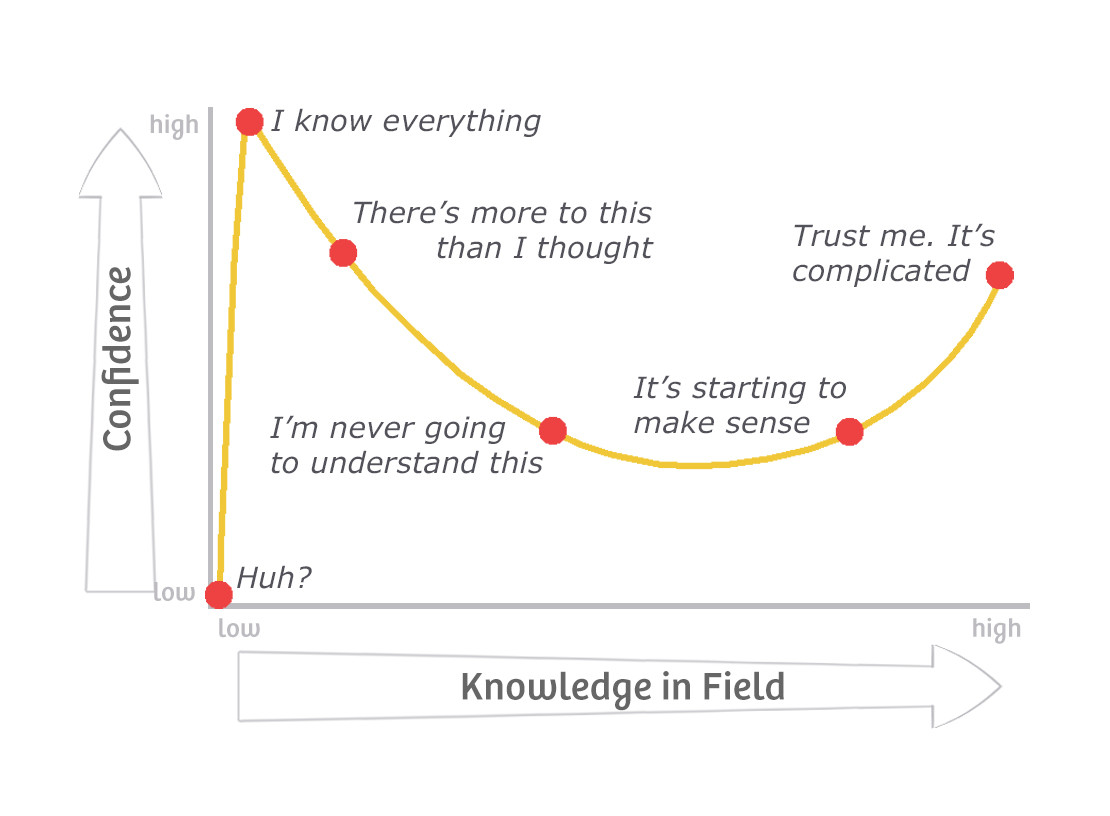The Dunning Kruger Effect
Someone asks you to rate yourself in a specific skill, you decided to give a good rating score since you feel you’re good at it, but a third person came in and gave a much lower rating score of your skill. You feel offended, maybe angry about this. “How can someone give me a low score?! I’m good at this! He/She doesn’t know me well!!” This is an example of what it is called, the Dunning-Kruger effect.
Example too extreme? How about this one, you have an exam tomorrow and you decided to open the textbook today, you’ve skimmed through several chapters, understood the main concepts, and bam!, you feel confident and ready to take the exam. You took the exam, came out feeling certain that you’ll get a good score but instead you got a lower score. “Dunning-Kruger”, right?
Another one, you’ve spent 6 months learning Spanish and became “pretty good” at it, now you believe if you go to Barcelona for a break, you can engage with the locals and chat with them easily, but someone else tells you that its not possible so you reject his/her opinion. Yep, “Dunning-Kruger” right there! Its obvious now that there are so many examples to this cognitive bias, but first let’s talk about it, and know what it is, and I believe once the awareness spreads, one can easily spot it and avoid having it.
So, what is Dunning-Kurger? Well, in Psychology’s definition, it is a cognitive bias in which people mistakenly assess their cognitive abilities as greater as than is (wiki). In other words, it is the effect of people over-inflating their capabilities without self-awarness. As bad as it sounds, we all have a certain degree of it, whether its rejecting an evaluation from a colleague, rejecting a suggestion from a friend, or claiming illusory superiority over a certain task. The problem is we rarely accept helpful input or opinion from other individuals because we, by instinct, believe we know what is best. It might be debatable when given the context of a situation where one has to make his/her own decision. However, there is a thin line between “self-evaluation” and “self-assurance”. We need to be able to practice the method of recognizing our incompetence or our weakness points and work on developing them rather than misdiagnose ourselves and ignore our incompetence.
Sometimes we address ourselves as experts in certain fields just because we know a small segment of it, with this constant “self-assurance” we morph into this false identity that rejects any criticism and barely re-evaluates his/her self. The “Dunning-Kruger” effect has a popular diagram that shows a relation between our confidence and knowledge. Second red region you see there is known as “Mr. Stupid” or “Mount Stupid”, because that region is where one fails to recognize his/her own incompetence which leads to inflated self-assesment. So much confidence, yet so little knowledge.
But the more time you spend on something or the more details you dive into, the more you recognize your own ignorance that you had before, right? The more knowledge or experience we gain, the more we recognize how fools we were (lesser confident), but afterwards we gain more confidence as we go.

There were times where we acted stupid, from a mild degree to a “King of Stupidity” degree. But that’s okay. Who’s gonna judge, huh? We all have to pass “Mount Stupid” at some point, but its us who decide whether to stay in that region (self-assurance) or to move on (self-evaluation). And really the only solution to avoid all this is regular self-evaluation. Its pretty normal if you’ve felt you were an Economist just because you read a chapter on Economics. What’s not normal though, is willingly impersonating this identity with that lack of knowledge.
We learn something new everyday, and taking others’ input is learning by itself. Simply dodging “Dunning-Kruger” by accepting colleague’s evaluation, friend’s opinion, elder’s advice, etc. Staying humble and helpful makes the difference. If you learn something, teach it to those who need it. If you’re unsure about something, ask those who might know the answer, or better yet, find the answer by yourself.
Self-evaluation, that’s all what you need to slide from that “Mount”.
